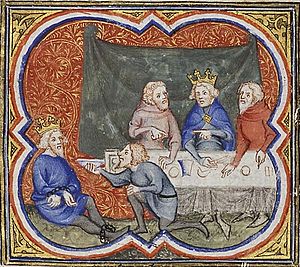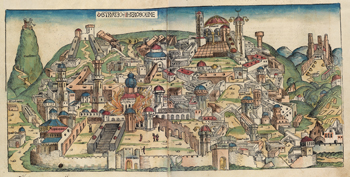For Sunday September 25, 2016
Lectionary Readings (Revised Common Lectionary, Year C)
Jeremiah 32:1–3, 6–15 or Amos 6:1–7
Psalm 91:1–6, 14–16 or Psalm 146
1 Timothy 6:6–19
Luke 16:19–31
When "the word of the Lord came to Jeremiah in the tenth year of Zedekiah king of Judah," Jerusalem was a war zone: "The army of the king of Babylon was then besieging Jerusalem." Think of the horrors in today's Aleppo.
The Babylonians had breached the city walls, then "burned down every important building" — the royal palace, government offices, and the sacred temple that had served as the center of Israel's religious life for 410 years since Solomon.
They executed government officials. Soldiers plundered Jerusalem's national treasures, and everything of any value, both sacred and secular. The narrator's historical details are painful to read — "pots, shovels, wick trimmers, ladles, censers, and sprinkling bowls."
Dead bodies littered the streets. The book of Lamentations describes children begging for bread, and even cannibalism. The intellectual elite, the skilled workers, and artisans were deported to Babylon. The poor "who owned nothing" were left to fend for themselves amidst disease and famine.
The puppet king Zedekiah was only twenty-one when he was installed by the conqueror Nebuchadnezzar II — who naturally imposed both financial tribute and an oath of allegiance. Maybe it was his youthful naivete, or nationalist zeal, but Zedekiah badly overplayed his pathetically weak hand.
He consulted with Jeremiah: "Please pray for us."
"Is there any word from the Lord?"
 |
|
King Zedekiah in chains before Neduchadnezzar, Petrus Comestor's "Bible Historiale," 1670.
|
Yes, said Jeremiah, he had not just some political advice, but a word from God, but it wasn't anything that anyone wanted to hear. Surrender to Babylon. Give up. Don't fool yourself. Don't listen to the "reckless lies" and "false dreams" of your sycophants. This is the end of the end. Accept defeat.
Later, Jeremiah wrote a famous letter to the exiles in Babylon, detailing the implications of his doomsday prophecy:
"This is what the Lord Almighty, the God of Israel, says to all those I carried into exile from Jerusalem to Babylon: 'Build houses and settle down; plant gardens and eat what they produce. Marry and have sons and daughters; find wives for your sons and give your daughters in marriage, so that they too may have sons and daughters. Increase in number there; do not decrease. Also, seek the peace and prosperity of the city to which I have carried you into exile. Pray to the Lord for it, because if it prospers, you too will prosper.' Yes, this is what the Lord Almighty, the God of Israel, says: 'Do not let the prophets and diviners among you deceive you. Do not listen to the dreams you encourage them to have. They are prophesying lies to you in my name. I have not sent them,' declares the Lord."
Such was Jeremiah's prophetic counsel: seek the welfare of your pagan conqueror! Pray for God's blessing on Babylon! Embrace your exile, for there will be no miraculous exodus.
Well, big surprise, Zedekiah didn't listen to such a defeatist and unpatriotic message. "Neither he nor his attendants nor the people of the land paid any attention to the words the Lord had spoken through Jeremiah the prophet."
Instead, they arrested Jeremiah. Maybe this was for his own protection, given his treasonous message, or maybe it was to silence him. Some of his critics warned Zedekiah that he would desert Jerusalem and flee to Babylon. After house arrest, they threw Jeremiah down a muddy cistern. Ironically, whereas his own people tried to murder Jeremiah, he was saved by a foreign official from Ethiopia.
So, Zedekiah broke his oath with Nebuchadnezzar, and made an alliance with Egypt for help. The Babylonian king crushed this pitiful revolt. Zedekiah fled Jerusalem at night, but was captured. His end was both pathetic and tragic: "They killed the sons of Zedekiah before his eyes. They then put out his eyes, bound him with bronze shackles, and took him to Babylon."
 |
|
God speaks to Jeremiah, Winchester Bible, 1160–1175.
|
If you go to the British Museum today, you can read about the siege of Jerusalem in the Babylonian Chronicles — clay tablets with cuneiform writing that were translated in 1956:
"In the seventh year, in the month of Kislev, the king of Akkad mustered his troops, marched to the Hatti-land, and encamped against the City of Judah and on the ninth day of the month of Adar he seized the city and captured the king. He appointed there a king of his own choice and taking heavy tribute brought it back to Babylon."
Despite Israel's national calamity, all the carnage and destruction, Jeremiah reassured his people that the siege of Jerusalem was not the last word. However tragic, it was only a penultimate word, for after the devastation there would come restoration.
Jeremiah 32 describes one of the crazy, symbolic actions for which the prophets were famous. Like Isaiah running naked in the streets for three years "as a sign and portent." Like Ezekiel eating the scroll, or shaving his head with a sword, dividing the hair into thirds, and then burning it all. Or Hosea's marriage to the harlot Gomer.
Jeremiah had already performed several prophetic acts. He stood in front of the temple and smashed pottery as the people entered for worship. He wore a cattle yoke around his neck. He buried a pair of "undergarments" under a rock for "a very long time."
And now, with the country in ruins, and under enemy occupation, God told him to buy his cousin's field. Go, buy a field in the war zone that is Jerusalem. Talk about crazy! It was an act of hope in a time of disaster.
To buy a field is to hope for the future.
Jeremiah's symbolic action reminds me of the Jesuit priest Daniel Berrigan (1921–2016), who performed his own very public and prophetic acts — most infamously, burning draft cards and hammering nuclear war heads. And like Jeremiah, Berrigan ended up in prison.
These were crazy acts. They seemed pointless. Who cared?! And indeed, Berrigan was nothing if not realistic about the political futility of it all.
 |
|
Babylonian destruction of Jerusalem, the Nuremberg Chronicle, 1493.
|
Jim O'Grady once asked Berrigan "if it was tiring to constantly work on the fringes — of the Catholic church, of American politics, of polite discourse. He referred me to his old friend Dorothy Day, founder of the Catholic Worker, a volunteer community devoted to pacifism and serving the poor. 'She’s always thought of herself and her work as residing at the center of the Gospels,' Berrigan said. 'It was up to everyone else to move toward her.'"
In his May 2, 2016 obituary, Daniel Lewis wrote about Berrigan's prophetic actions, but also about his deep discouragements: "While he was known for his wry wit, there was a darkness in much of what Father Berrigan wrote and said, the burden of which was that one had to keep trying to do the right thing regardless of the near certainty that it would make no difference. In the withering of the pacifist movement and the country’s general support for the fighting in Iraq and Afghanistan, he saw proof that it was folly to expect lasting results."
“This is the worst time of my long life,” Berrigan said in an interview with The Nation in 2008. “I have never had such meager expectations of the system.” What made it bearable, he wrote elsewhere, was a disciplined, implicitly difficult belief in God as the key to sanity and survival."
Such was God's word to Jeremiah during the siege of Jerusalem, and perhaps to us today — brutal realism about our political realities, but also prophetic acts of hope in God.
Image credits: (1) Wikipedia.org; (2) Art Encyclopedia; and (3) Wikipedia.org.



